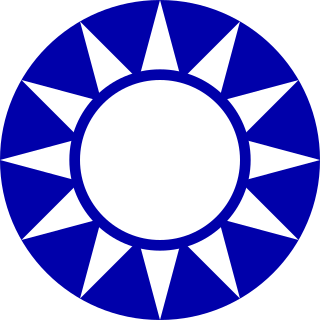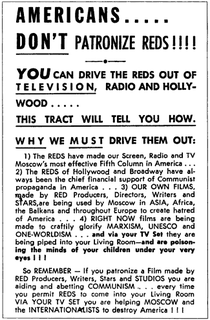
The Bolsheviks, also known in English as the Bolshevists, were a faction founded by Vladimir Lenin and Alexander Bogdanov that split from the Menshevik faction of the Marxist Russian Social Democratic Labour Party (RSDLP), a revolutionary socialist political party formed in 1898, at its Second Party Congress in 1903.

The Communist Party of China (CPC), also referred to as the Chinese Communist Party (CCP), is the founding and ruling political party of the People's Republic of China. The Communist Party is the sole governing party within mainland China, permitting only eight other, subordinated parties to co-exist, those making up the United Front. It was founded in 1921, chiefly by Chen Duxiu and Li Dazhao. The party grew quickly, and by 1949 it had driven the nationalist Kuomintang (KMT) government from mainland China after the Chinese Civil War, leading to the establishment of the People's Republic of China. It also controls the world's largest armed forces, the People's Liberation Army.

The Kuomintang of China, also spelled as Guomindang and often alternatively translated as the Nationalist Party of China (NPC) or the Chinese Nationalist Party (CNP), is a major political party in the Republic of China based in Taipei that was founded in 1911. The KMT is currently an opposition political party in the Legislative Yuan.
In political science, Marxism–Leninism was the official state ideology of the Soviet Union (USSR), of the parties of the Communist International, after Bolshevisation; and is the ideology of Stalinist political parties. The purpose of Marxism–Leninism is the revolutionary transformation of a capitalist state into a socialist state, by way of two-stage revolution, which is led by a vanguard party of professional revolutionaries, drawn from the proletariat. To realise the two-stage transformation of the state, the vanguard party establishes the dictatorship of the proletariat, which determines policy through democratic centralism.

McCarthyism is the practice of making accusations of subversion or treason without proper regard for evidence. The term refers to U.S. senator Joseph McCarthy (R-Wisconsin) and has its origins in the period in the United States known as the Second Red Scare, lasting from the late 1940s through the 1950s. It was characterized by heightened political repression and a campaign spreading fear of communist influence on American institutions and of espionage by Soviet agents.
Maoism, or Mao Zedong Thought, is the Chinese communist variety of Marxism–Leninism that Mao Zedong developed for realising a socialist revolution in the agricultural, pre-industrial society of the People's Republic of China. From the 1950s until the Chinese economic reforms of Deng Xiaoping in the late 1970s, Maoism was the political and military ideology of the Communist Party of China and of Maoist revolutionary movements throughout the world. The philosophic difference between Maoism and Marxism–Leninism is that the peasantry are the revolutionary vanguard in pre-industrial societies.

The Communist International (Comintern), known also as the Third International (1919–1943), was an international organization that advocated world communism. The Comintern resolved at its Second Congress to "struggle by all available means, including armed force, for the overthrow of the international bourgeoisie and the creation of an international Soviet republic as a transition stage to the complete abolition of the state". The Comintern had been preceded by the 1916 dissolution of the Second International.

The Communist Party of Vietnam (CPV) is the founding and ruling communist party of the Socialist Republic of Vietnam. Since 1988, it has been the only legal party in the country. Although it nominally exists alongside the Vietnamese Fatherland Front, it maintains a unitary government and has centralised control over the state, military and media. The supremacy of the Communist Party is guaranteed by Article 4 of the national constitution. The current party's leader is Nguyễn Phú Trọng, who holds the titles of General Secretary of the Central Committee and Secretary of the Central Military Commission.

The Communist Party of India (CPI) is the oldest communist party in India. It is one of the eight national parties of India. There are different views on exactly when it was founded. The date maintained as the foundation day by the CPI is 26 December 1925. The Communist Party of India (Marxist), also a national party, separated from the CPI in 1964 following an ideological rift between China and the Soviet Union, continues to claim having been founded in 1925.

Ana Pauker was a Romanian communist leader and served as the country's foreign minister in the late 1940s and early 1950s. Ana Pauker became the world's first female foreign minister when entering office in December 1947. She was also the unofficial leader of the Romanian Communist Party immediately after World War II.
The Communist Part of Turkestan was the Turkestani branch of the Russian Communist Party (bolsheviks). It was formed in June 1918. At the time of its formation, the party was joined by a large section of Jadids.
Far-left politics are political views located further on the left of the left-right spectrum than the standard political left.

The Ramadan Revolution, also referred to as the 8 February Revolution and the February 1963 coup d'état in Iraq, was a military coup by the Ba'ath Party's Iraqi-wing which overthrew the Prime Minister of Iraq, Abd al-Karim Qasim in 1963. It took place between 8 and 10 February 1963. Qasim's former deputy, Abdul Salam Arif, who was not a Ba'athist, was given the largely ceremonial title of President, while prominent Ba'athist general Ahmed Hassan al-Bakr was named Prime Minister. The most powerful leader of the new government was the secretary general of the Iraqi Ba'ath Party, Ali Salih al-Sa'di, who controlled the National Guard militia and organized a massacre of hundreds—if not thousands—of suspected communists and other dissidents following the coup.

The Labour-Farmer Party was a political party in the Empire of Japan. It represented the left wing sector of the legal proletarian movement at the time. Oyama Ikuo was the chairman of the party. At the time the party was banned by the government in 1928, it was estimated to have around 90,000 members in 131 local organizations. The party was supported by the Hyōgikai trade union federation and the Japan Peasant Union.
The Proletarian Masses Party was a short-lived political party in Japan. It was founded on July 22, 1928 by the Rōnō faction. Suzuki Mosaburō became the general secretary of the party. Yamakawa and Sakai Toshihiko functioned as 'elder' advisors in the party. Other prominent founders of the party were Kuroda, Inamura Junzo and Okada.
The All-Indonesian Federation of Workers'Organisations was the largest trade union federation in Indonesia. It was closely linked to the Communist Party of Indonesia (PKI), but was suppressed along with the PKI after the 1965 coup that installed the New Order regime.
The Unified Egyptian Communist Party was a political party in Egypt. The party was founded in February 1955 through the merger of the Democratic Movement for National Liberation (HADITU) and six splinter organizations. The talks regarding the merger were held without the HADITU leader Henri Curiel being aware of them. Once the merger was finalized Curiel and HADITU leader Kamal Abd al-Halim were excluded from membership in the new party. Curiel and Abd al-Halim were allowed to enter the party in 1956, and after the 1956 war Curiel was included in its Central Committee.

The Hungarian Soviet Republic or literally Republic of Councils in Hungary was a short-lived communist rump state. When the Republic of Councils in Hungary was established in 1919, it controlled only approximately 23% of the territory of Hungary's classic borders.

James Patrick "Jim" Cannon was an American Trotskyist and a leader of the Socialist Workers Party.

Liu Shaoqi was a Chinese revolutionary, politician, and theorist. He was Chairman of the NPC Standing Committee from 1954 to 1959, First Vice Chairman of the Communist Party of China from 1956 to 1966 and Chairman (President) of the People's Republic of China, China's de jure head of state, from 1959 to 1968, during which he implemented policies of economic reconstruction in China.













